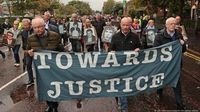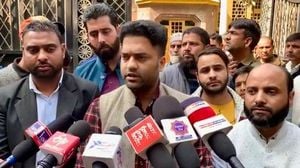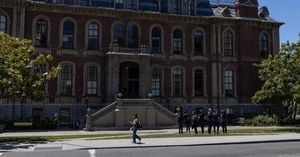In a moment long awaited by families, campaigners, and observers across Northern Ireland and beyond, the only person ever charged in connection with the 1972 Bloody Sunday massacre has finally stood trial in Belfast. Known only as Soldier F, the former British paratrooper faces two counts of murder and five counts of attempted murder for his alleged role in one of the darkest chapters of the Troubles—a period of sectarian conflict that scarred Northern Ireland for decades.
The trial, which opened on September 15, 2025, at Belfast Crown Court, marks the culmination of more than half a century of relentless campaigning by the families of the victims. On that fateful day—January 30, 1972—British soldiers opened fire on unarmed civil rights demonstrators in Londonderry, or Derry as it’s known to many locals. Thirteen people were killed outright, and a fourteenth died months later from injuries sustained during the shooting. At least 15 others were injured in the violence, which quickly became a defining event of the Troubles.
As the proceedings began, Soldier F—his identity protected by a court order for fear he could become a target—was shielded from public view behind a floor-to-ceiling curtain. The courtroom was presided over by Mr Justice Fowler, with no jury present, a measure permitted in exceptional cases in Northern Ireland. This extraordinary level of anonymity and security underscored the trial’s gravity and the lingering tensions it has reignited, decades after the original events.
Prosecutor Louis Mably set the tone for the trial in his opening remarks, declaring, “The civilians ... did not pose a threat to the soldiers and nor could the soldiers have believed that they did. The civilians were unarmed and they were simply shot as they ran away.” According to the Associated Press, Mably further argued that the shooting was not only unnecessary but carried out with intent to kill or cause serious harm, describing the act as “unjustified, gratuitous, and dire in its consequences.”
Outside the courthouse, the emotional weight of the day was palpable. Families of the victims, some carrying photographs of their lost loved ones and walking behind a banner reading “Towards Justice,” gathered in a solemn march to the court. John McKinney, whose brother William was among those killed, spoke to reporters: “It has taken 53 years to get to this point, and we have battled all the odds to get here. We will shortly occupy a courtroom very proudly, with our heads held high and in the knowledge that, regardless of the ultimate outcome, we are on the right side of history.”
The Bloody Sunday massacre unfolded against the backdrop of a deeply divided Northern Ireland. The civil rights marchers who were targeted that day were predominantly Catholic, seeking an end to internment without trial and broader discrimination. The soldiers who confronted them were largely drawn from the Protestant community and represented the British state, which a significant portion of the population wanted to remain part of. The violence of Bloody Sunday became a flashpoint, fueling decades of conflict between those who favored a united Ireland and those determined to remain within the United Kingdom.
For years, official narratives held that the soldiers had fired in self-defense after being attacked by gunmen and bombers. A 1972 tribunal led by Lord Widgery cleared the soldiers of wrongdoing, a finding that only deepened the wounds for the families of the dead. But in 2010, after a far-reaching inquiry led by Lord Saville, the truth began to emerge. The Saville Inquiry concluded that the killings were “unjustified and unjustifiable,” and that the victims had been unarmed and posed no threat. Then-Prime Minister David Cameron issued a formal apology, admitting, “The killings were unjustified and unjustifiable.”
Yet, justice remained elusive for many years. Police investigations into the events of Bloody Sunday began in earnest in 2012, but it wasn’t until 2019 that prosecutors announced charges against Soldier F. Sixteen other former soldiers and two alleged members of the Official Irish Republican Army were investigated, but the authorities determined there was insufficient evidence to charge them. In 2021, the Public Prosecution Service dropped the case against Soldier F, citing concerns they could not prevail at trial after a judge ruled key prosecution evidence inadmissible in a related case. However, a successful appeal by the family of one of the victims saw the case reinstated, bringing Soldier F back before the court.
Soldier F stands accused of the murders of James Wray, 22, and William McKinney, 26, as well as the attempted murders of Joseph Friel, Michael Quinn, Joe Mahon, Patrick O’Donnell, and others. Prosecutors allege that on Bloody Sunday, Soldier F was part of a small group of paratroopers who moved into the Glenfada Park area of Derry and opened fire on civilians as they fled. Mably told the court, “It was carried out, given the weapon involved, with an intent to kill or cause serious harm.” He also noted that, in the aftermath, soldiers gave false accounts in an effort to justify the shootings, but colleagues later admitted that Soldier F had opened fire.
The trial has not only reawakened the pain of the victims’ families but has also stirred strong feelings among veterans of the conflict. Outside the court, the Northern Ireland Veterans Commissioner, David Johnstone, voiced the frustrations of many former soldiers, stating, “Many veterans today feel frustrated, feel angry, and indeed feel betrayed by the legacy process since 1998. There must first be a fair and balanced legacy process, a process that does not facilitate the wholesale demonization of those who served and certainly not facilitate the rewriting of the history of the Troubles.” According to The Guardian, supporters of Soldier F, including former soldiers, gathered outside the court, some wearing Parachute Regiment berets, to show solidarity.
The trial’s outcome is being watched closely by both the British and Irish governments, as well as by veterans’ groups and the broader public. The case has also reignited debate over the so-called Legacy Act, passed by a previous Conservative government in an attempt to phase out prosecutions for Troubles-era crimes. Both London and Dublin are now discussing ways to repeal the act, reflecting the ongoing struggle to balance justice, reconciliation, and the complexities of Northern Ireland’s past.
For the families of those killed and wounded on Bloody Sunday, this trial is more than just a legal proceeding—it is the culmination of decades of grief, advocacy, and hope. As Tony Doherty, whose father Patrick was among the dead, put it, “We have waited 53 long years for justice and, hopefully, we will see a measure of it through this trial.” The courtroom drama unfolding in Belfast is not only about one man’s guilt or innocence, but about whether a society can finally reckon with its most painful memories and move towards a more just future.





